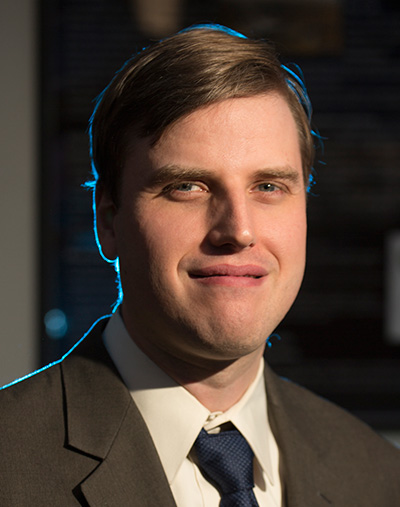CSUF News Service
CSUF Scientists Contribute to First Detection of Gravitational Waves From Colliding Neutron Stars
Oct. 16, 2017
Jocelyn Read
assistant professor of physics
 Read is an astrophysicist who studies neutron stars — the remnant cores of dead stars that didn't quite have enough mass to end up as black holes. A leading binary neutron star expert, she focuses on how matter behaves at the extremely high densities inside neutron stars and how this might be measured from astronomical observations of X-rays, gamma-ray bursts and gravitational waves. Read and her students work to understand and model how neutron stars interact, collide and radiate energy to learn more about their structure and composition.
Read is an astrophysicist who studies neutron stars — the remnant cores of dead stars that didn't quite have enough mass to end up as black holes. A leading binary neutron star expert, she focuses on how matter behaves at the extremely high densities inside neutron stars and how this might be measured from astronomical observations of X-rays, gamma-ray bursts and gravitational waves. Read and her students work to understand and model how neutron stars interact, collide and radiate energy to learn more about their structure and composition.
Read joined Cal State Fullerton in 2012 and has received numerous grants for her research. Most recently, she was awarded nearly $1 million from the National Science Foundation to lead a project to recruit and support underrepresented students, in particular Latino students, in gravitational-wave science. The grant supports CSUF and Citrus College students engaged in undergraduate research, as well as CSUF alumni in the doctoral program in gravitational-wave astrophysics at Syracuse University.
A native of Calgary, Alberta, Canada, Read earned her doctorate in physics from the University of Wisconsin-Milwaukee and a bachelor's degree in mathematics and physics from the University of British Columbia in Vancouver. She completed postdoctoral work at the Albert Einstein Institute in Germany and at the University of Mississippi. Read, a member of the LIGO Scientific Collaboration, serves as associate director of CSUF's Gravitational-Wave Physics and Astronomy Center. She is the recipient of the 2017 "Women of the Year" award in the category of science and technology from state Sen. Josh Newman.
Joshua Smith
associate professor of physics
 Smith is the inaugural Dan Black Director of Gravitational-Wave Physics and Astronomy who leads a team of faculty and student researchers at Cal State Fullerton's Gravitational-Wave Physics and Astronomy Center. The researchers were key contributors to the first detection of gravitational waves from colliding black holes in 2015, as well as three more confirmed detections that have since been announced.
Smith is the inaugural Dan Black Director of Gravitational-Wave Physics and Astronomy who leads a team of faculty and student researchers at Cal State Fullerton's Gravitational-Wave Physics and Astronomy Center. The researchers were key contributors to the first detection of gravitational waves from colliding black holes in 2015, as well as three more confirmed detections that have since been announced.
Since joining Cal State Fullerton in 2010, Smith has secured more than $3.4 million in grant funding for his gravitational-wave research efforts, including a $450,000 National Science Foundation (NSF) Early Career Development Program award in 2013, given to young faculty scholars for early career research and teaching.
Most recently, Smith was awarded a $634,000 NSF grant for "Data Handling and Analysis Infrastructure for Gravitational-wave Astronomy," in which he and his students are assisting the Advanced Laser Interferometer Gravitational-wave Observatory (LIGO) in its ongoing exploration of the universe to detect gravitational waves from various sources. He also is co-leading a nearly $1 million NSF grant project to recruit and support the number of underrepresented students, in particular Latino students, in gravitational-wave science.
A member of the LIGO Scientific Collaboration, Smith chaired the LIGO Characterization group from 2011 to 2015, which monitors and assesses the data quality of the LIGO instruments. In 2015, the Research Corporation for Science Advancement named him a Cottrell Scholar, and last year, the Orange County Register chose him as one of the county's "Most Influential."
Smith, a native of Indian Lake, New York, holds a bachelor's degree in physics from Syracuse University and earned his doctorate in physics from Leibniz Universitat in Hannover, Germany. He was a postdoctoral fellow at Germany's Albert Einstein Institute, and a postdoctoral associate at Syracuse University, where he worked on optical technology and detector characterization for LIGO.
Geoffrey Lovelace
associate professor of physics
 Lovelace is a theorist specializing in numerical relativity. His research focuses on modeling sources of gravitational waves, such as merging black holes and colliding neutron stars, using supercomputer simulations.
Lovelace is a theorist specializing in numerical relativity. His research focuses on modeling sources of gravitational waves, such as merging black holes and colliding neutron stars, using supercomputer simulations.
Earlier this year, he received the National Science Foundation’s (NSF) prestigious Faculty Early Career Development (CAREER) award, given to support faculty members early in their careers who have the potential to serve as academic role models in research and education. He was awarded $400,000 for his five-year project "CAREER: Computational Gravitational-Wave Science and Education in the Era of First Observations." He also is co-leading a nearly $1 million NSF grant project to recruit and support the number of underrepresented students, in particular Latino students, in gravitational-wave science.
Lovelace, who grew up in Lansdale, Pennsylvania, is a member of the LIGO Scientific Collaboration and the Simulating eXtreme Spacetimes (SXS) collaboration. He earned his doctorate in physics from Caltech and his bachelor's degree in physics from the University of Oklahoma. Lovelace worked for five years as a research associate at Cornell University before joining Cal State Fullerton's faculty in 2012
